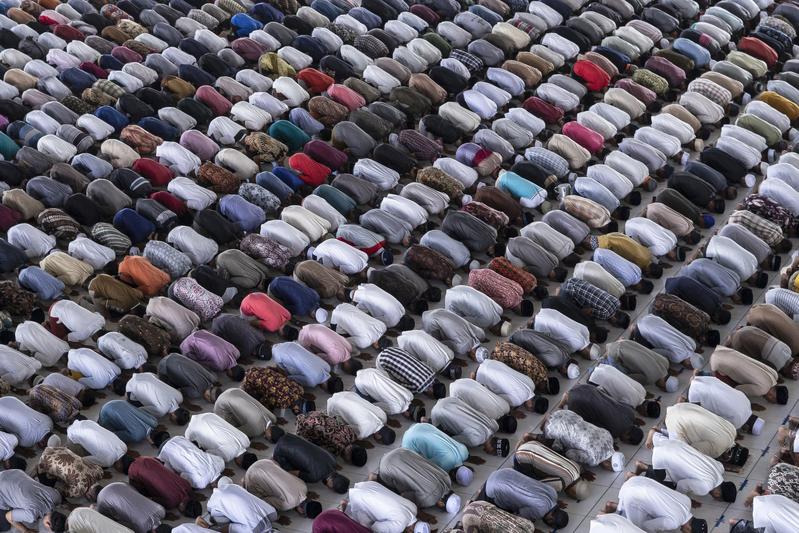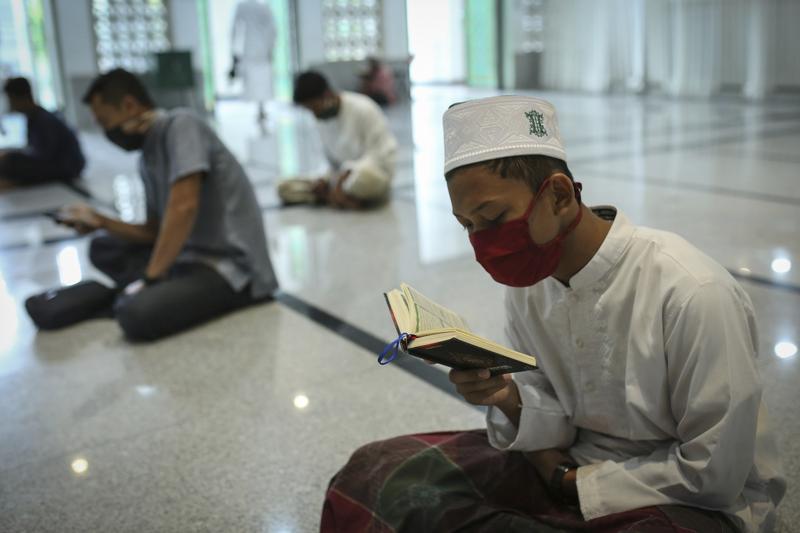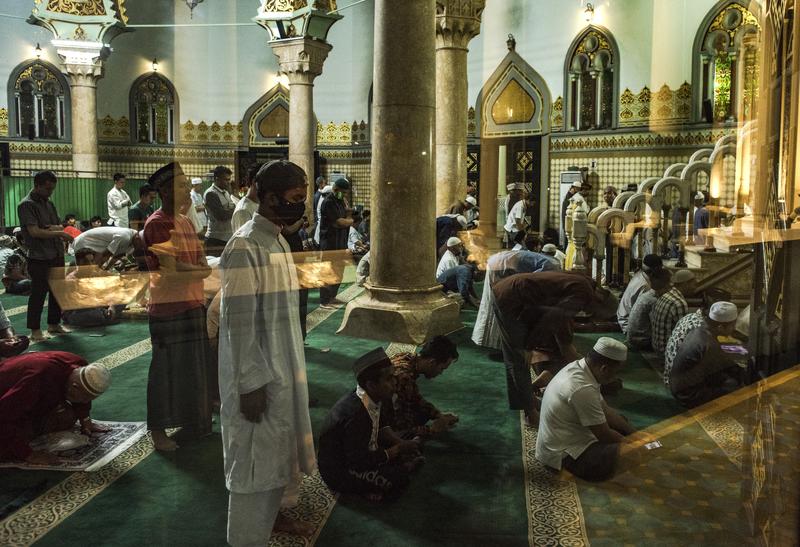 Muslim men attend a Friday prayer despite concerns of the new coronavirus outbreak, at a mosque during the first day of the holy fasting month of Ramadan in Lhokseumawe, in the religiously conservative province of Aceh, Indonesia, April 24, 2020. During Ramadan, which begins Friday, faithful Muslims normally fast during the day and then congregate for night prayers and share communal meals. (ZIK MAULANA / AP)
Muslim men attend a Friday prayer despite concerns of the new coronavirus outbreak, at a mosque during the first day of the holy fasting month of Ramadan in Lhokseumawe, in the religiously conservative province of Aceh, Indonesia, April 24, 2020. During Ramadan, which begins Friday, faithful Muslims normally fast during the day and then congregate for night prayers and share communal meals. (ZIK MAULANA / AP)
JAKARTA — Governments of Asian nations with large Muslim populations urged people to keep their distance while observing their faith as Islam’s fasting month of Ramadan began on Friday, shrouded in fear over the coronavirus.
Early outbreaks in Asia, home to the bulk of the world’s 1.8 billion Muslims, were traced in many cases to pilgrims returning from Iran and Saudi Arabia, as in Afghanistan and Pakistan, or gatherings of Islamic groups, as in India and Malaysia.
It doesn’t matter that we cannot pray together at the mosque. Perhaps this is a God-given opportunity for us to pray with our families at home instead
Muhyiddin Yassin, Malaysian Prime Minister
During Ramadan, set to begin on Friday or Saturday, depending on the sighting of the new moon, Muslims join their families to break the fast at sunset, go to mosques to pray and look to spend time with relatives.
But the risk of full-blown epidemics has changed priorities, with curbs imposed on large gatherings for prayers and public iftars, or meals to break the fast.
“Just like when we fast, we must struggle and fight against our desires,” Malaysian Prime Minister Muhyiddin Yassin said in a televised address to his country, one of the hardest hit by the virus in Southeast Asia.
“It doesn’t matter that we cannot pray together at the mosque. Perhaps this is a God-given opportunity for us to pray with our families at home instead.”
On Thursday, his government extended curbs on movement until May 12, cancelled popular evening bazaars and banned attendance at mosque prayers as well as travel back to people’s hometowns.
 Muslim men wearing face masks as a precaution against coronavirus men read the holy book of Quran during the first day of the holy fasting month of Ramadan at a mosque in the religiously conservative province of Aceh, Indonesia, April 24, 2020. During Ramadan, which begins Friday, faithful Muslims normally fast during the day and then congregate for night prayers and share communal meals. (HERI JUANDA / AP)
Muslim men wearing face masks as a precaution against coronavirus men read the holy book of Quran during the first day of the holy fasting month of Ramadan at a mosque in the religiously conservative province of Aceh, Indonesia, April 24, 2020. During Ramadan, which begins Friday, faithful Muslims normally fast during the day and then congregate for night prayers and share communal meals. (HERI JUANDA / AP)
In neighbouring Indonesia, which has the world’s biggest Muslim population, President Joko Widodo repeated a call for people to work and pray at home during a national address. Indonesia has identified 7,775 infections, and 647 deaths, for Asia’s highest toll outside China, where the disease emerged.
On the island of Java, Tatan Agustustani, 52, and his family were busy clearing furniture from their lounge room to make way for prayer mats.
“It’s the same in the mosque or at home,” said Agustustani, who lives in Bogor, on the outskirts of Jakarta, the capital. “For me, no matter where we are, prayers must go on, even though we cannot pray in the mosque.”
But that message appeared lost in Aceh, the sharia-ruled province at the far western tip of the archipelago nation, as
worshippers crowded into a mosque for tarawih prayers on the eve of Ramadan.
Some said their fate was not in their hands, although many wore masks as they lined up shoulder-to-shoulder to pray.
 Muslim men attend an evening prayer called 'tarawih' marking the first evening of the holy fasting month of Ramadan despite concerns of the new coronavirus outbreak at Al Mashun Mosque in Medan, North Sumatra, Indonesia, April 23, 2020. The coronavirus pandemic is cutting off the world's 1.8 billion Muslims from their cherished Ramadan traditions as health officials battle to ward off new infections during Islam's holiest month, haunted by multiple outbreaks traced to previous religious gatherings. (FAUZY CHANIAGO / AP)
Muslim men attend an evening prayer called 'tarawih' marking the first evening of the holy fasting month of Ramadan despite concerns of the new coronavirus outbreak at Al Mashun Mosque in Medan, North Sumatra, Indonesia, April 23, 2020. The coronavirus pandemic is cutting off the world's 1.8 billion Muslims from their cherished Ramadan traditions as health officials battle to ward off new infections during Islam's holiest month, haunted by multiple outbreaks traced to previous religious gatherings. (FAUZY CHANIAGO / AP)
“In our belief, it is God who decides when we will die,” said one devotee, Taufik Kelana. “But we will stay alert, like wearing a mask.”
In Brunei, the tiny oil rich sultanate that shares the island of Borneo with Malaysia and Indonesia, mosques have been temporarily closed and people urged to pray at home. Brunei has reported 138 infections.
NO IFTAR
Leaders of India’s 160 million-strong Muslims have urged people to heed the nationwide lockdown throughout the month
In South Asia, Ramadan is expected to start on Saturday.
Leaders of India’s 160 million-strong Muslims have urged people to heed the nationwide lockdown throughout the month. The lockdown in India, which has recorded 23,076 infections, including 718 deaths, is set to end on May 3.
“If the lockdown does not end on May 3 or soon after, it will be a Ramadan unlike any in my 55 years,” said Salim Mohammed, a property agent in the western city of Ahmedabad.
Muslims, who form 12 percent of India’s population of 1.3 billion, faced renewed pressure from Hindu hardline groups tied to Prime Minister Narendra Modi’s ruling alliance and vigilante groups after a large number of infections were linked to a religious gathering of a Sunni missionary group.
The Tablighi Jamaat event in mid-March drew participants from across India, neighbouring Bangladesh and even Indonesia and Malaysia.
ALSO READ: In shadow of virus, Muslims face a Ramadan like never before
The reputed All India Islamic Centre of religious teaching will livestream recitation of two chapters of the Koran, the Muslim holy book, from 8 pm to 10 pm each day.
“This is the best way to pray to Allah and keep everyone safe,” said its chairman, Khalid Rashid Firangi Mahali.
“There should be no Roza Iftaar parties at all. Instead that money should be used for food and rations for the poor.”
Bangladesh has ordered mosques to restrict Ramadan evening prayers to 12 people and banned iftar gatherings, while Sri Lanka has closed mosques to the public.
Doctors in Pakistan are worried by the government’s decision to lift curbs on mosque congregations for Ramadan.
Pakistan has 11,155 virus infections with 237 deaths, but doctors, and the government, say the outbreak has yet to peak.
READ MORE: Palestinians face joyless Ramadan
Heeding doctors’ advice, the government of the southern province of Sindh ordered tarawih prayers performed at home, limiting Friday mosque gatherings to three to five people.
“All I can say is it is another test by Allah,” said Nur Alam, 65, a refugee in Bangladesh, whose son was shot dead during the Myanmar military crackdown of 2017, in which hundreds of thousands of Rohingya fled into the neighbouring country.
“I’ll fast and will keep praying to Allah. The virus would go away. May Allah keep everyone safe out there and everywhere.”


